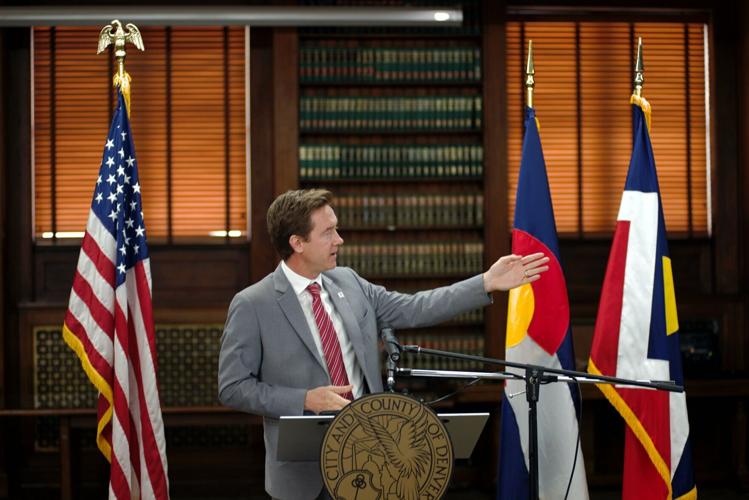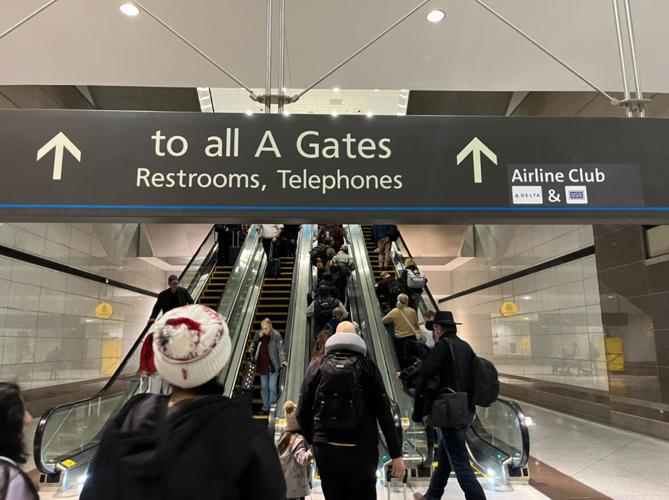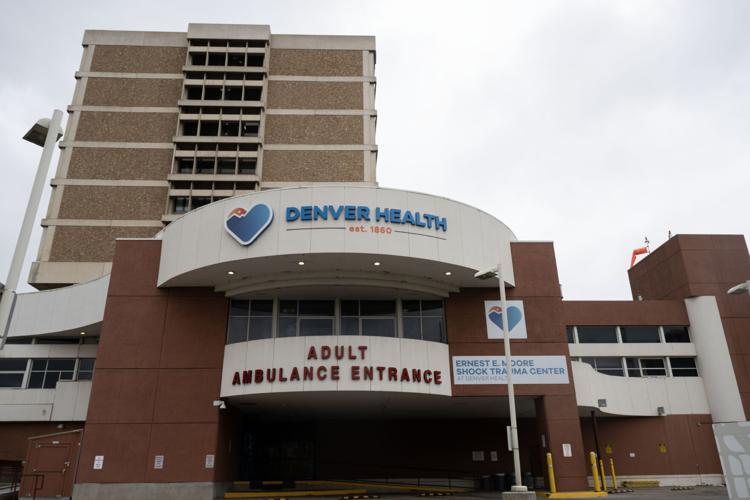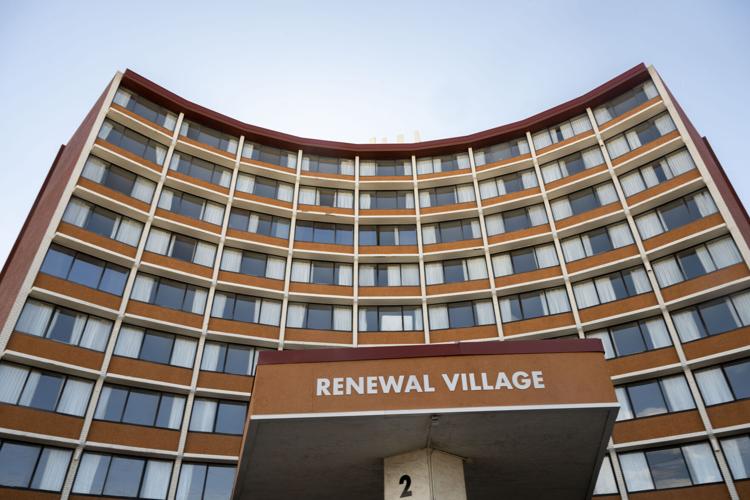Trump’s immigration orders put Denver’s federal dollars at risk
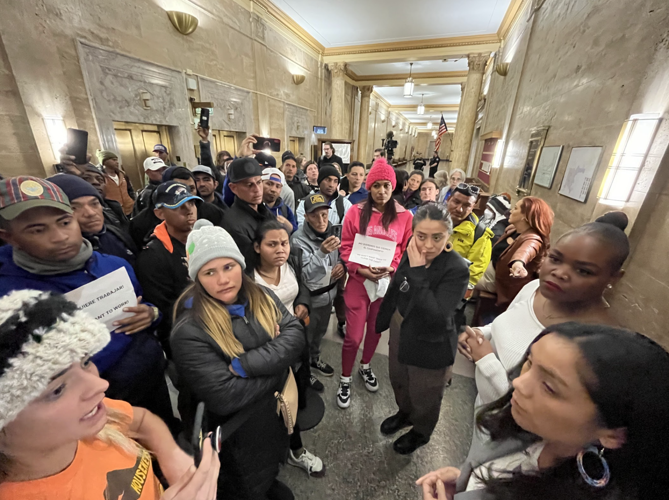
A group of immigrants talked to District 8 Councilmember Shontel Lewis (left) and at-large Councilmember Serena Gonzales-Gutierrez (right) outside the council's chambers on Jan. 2. The immigrants, who crossed America's southern border illegally and arrived in Denver, urged councilmembers to help them obtain work permits.
Noah Festenstein/Denver Gazette
Colorado’s most populous city faces the risk of losing hundreds of millions of federal dollars under a slew of directives that President Donald Trump issued as part of his campaign to crack down on illegal immigration, a crisis that has spilled over from the border into America’s interior cities.
In an executive order, Trump outlined a series of actions to combat the “unprecedented flood of illegal immigrants” into the county. Specifically, Trump has tasked the U.S. Attorney General and the U.S. Secretary of the Department of Homeland Security with the power to ensure “so-called sanctuary jurisdictions” do not receive access to federal funds.
Such jurisdictions, the executive order said, seek to “interfere with the lawful exercise of federal law enforcement operations.”
Under Trump’s order, governments that do not cooperate with his immigration enforcement could also find themselves facing civil or criminal action.
No legal definition of a “sanctuary” city or state exists, but, broadly speaking, it refers to a local jurisdiction that expressly refuses to cooperate with federal authorities on enforcing immigration laws. Both Colorado and Denver have approved statutes that fall under that broad definition.
Already, Denver Mayor Mike Johnston is on the radar of the Trump administration after vowing to repudiate Trump’s plan for a mass deportation. More recently, Johnston said he is preparing the city for “all eventualities,” including losing federal funds, over his public objections to the president’s immigration plans.
Exactly how much money Denver could lose — and how quickly that money could disappear — is complicated, according to a former federal regulatory analyst.
Will federal funding dry up instantly?
It’s not clear whether withholding federal money under Trump’s directive is limited to grant funding or include sources, such money for contracts to eligible agencies within the City and County of Denver.
Fran Santagata, a former regulatory analyst with the U.S. Department of Homeland Security, said it won’t be as straightforward as already-allocated federal dollars no longer going to Denver.
“The power of the purse, in this case, doesn’t rest solely with the Office of the President,” Santagata said. “The power rests with Congress, and in particular, in the appropriation language assigned to each federal grant.”
What this means is that once the official language for a particular federal grant is established by Congress, that language follows the money downstream to the recipient and, in most cases, cannot be changed, she said.
Santagata said that while Trump may have some political sway in Congress, it will be difficult to just immediately cut federal funding.
But for new grants, specific language tied to compliance with immigration policy could definitely be added in the future, Santagata said.
Even those will not dry up instantly, as many large federal grants have a multi-year performance period, during which money is disbursed as project milestones are met. Thus, cutting off federal funds entirely could take several years, according to Santagata.
Also at risk: Money for nonprofits in the immigration arena
Trump’s executive order also calls for a review of contracts with non-governmental organizations that support or provide services to immigrants unlawfully staying in the U.S.
More specifically, the order pauses distribution of money to those groups pending the review and terminates the agreements “determined to be in violation of law or to be sources of waste, fraud, or abuse.” The order also includes a “clawback or recoupment procedures” for such groups, which means nonprofits may find themselves not only losing money but also potentially facing orders to pay back the federal government.
Trump’s executive order also directs the Office of Management and Budget to compile a list of “all federal grant money” received by “sanctuary” jurisdictions.
So, what does this mean for Denver?
On an annual basis, the City and County of Denver receives between 100 and 180 grant awards totaling $100 to $350 million from a combination of federal, state, and private sources, according to the city’s 2025 adopted budget.
City agencies with the largest grant portfolios include the Department of Transportation and Infrastructure, Denver Economic Development and Opportunity, the Department of Housing Stability, the Department of Public Health and Environment, and the Office of Children’s Affairs-Head Start.
In 2024, the city’s federal grant expenditure was estimated to be just over $217 million, with a large chunk of that coming from the expiring American Rescue Plan Act.
Denver used most of that post-COVID recovery money for homeless shelters and other affordable housing projects, such as the Renewal Village at 200 W. Warner Pl.
The city’s budget book estimates federal grant expenditures at $99.2 million for 2025, less than half of what it spent the previous year.
When asked about the potential risk of the president withholding federal funding, Denver officials insisted the city has worked closely with the White House to ensure compliance with mandates.
“Denver has been compliant and responsive to presidential administrations with regard to grants as we intend to be with the incoming administration,” Josh Rosenblum, a spokesperson for the office of Denver’s chief financial officer, said in a statement. “In every administration, the city has worked closely with state and federal partners to ensure continued funding for public services and infrastructure, and we will continue to do so.”
On a state level, the numbers are bigger and harder to define, as they are spread across multiple sources, and the final numbers are often released with a delay as grant managers close out projects.
But for the state, the federal funding amounts to billions of dollars.
Colorado received about $16.4 billion in federal funds in Fiscal Year 2021, according to USAFacts, a nonpartisan organization that provides data and reports on the United States population and its government’s finances.
This total includes money transferred to Colorado’s state government, as well as funds sent directly to local entities within the state, such as cities and school districts. The federal funding helps to pay for things like infrastructure, education, and health care for low-income people.
Is infrastructure funding at stake?
Federal funding covers a long list of Denver’s infrastructure projects.
Among the biggest is $149.9 million in Federal Transit Administration (FTA) grant awarded to RTD to build a bus rapid transit line along East Colfax Avenue. As envisioned, the line will provide more frequent transit between downtown Denver and the Colfax light rail station.
“We think those dollars will continue on path,” Johnston, the mayor, told reporters in January. “But, we’re gonna prepare for all outcomes and continue with this plan we have and focus on vibrant, safe and affordable Denver with all the resources we’re using here.”
The U.S. Department of Transportation’s Reconnecting Communities and Neighborhoods Grant Program awarded Denver $37 million in federal investments in March of 2024 aimed at improving infrastructure and connecting “marginalized” communities divided by historic highway projects.
Earlier this year, Denver International Airport announced a $26.6 million grant from the Federal Aviation Administration’s Airport Improvement Program (AIP) to fund a portion of a project to modernize the airport’s baggage handling system. According to the FAA’s website, AIP grants fund airport infrastructure projects such as runways, taxiways, signage, lighting, and markings.
The FAA’s regular Airport Improvement Program (AIP) provides more than $3.18 billion annually in entitlement and discretionary grant funds for a network of more than 3,300 eligible airports.
Airports are entitled to a certain amount of AIP funding each year based on passenger volume.
“DEN will work closely with the new administration, just as we have with all prior administrations to ensure we serve the traveling public in a safe and optimal manner,” the airport authority said in a statement to The Denver Gazette.
What about education dollars?
Federal funding accounts for roughly 10% of the state budget, according to the Colorado Department of Education.
That percentage of the federal funding has ranged from 10% in the 2018-2019 school year to as high as 15% in the 2022-2023 academic year.
This school year, federal funding accounted for $870.2 million of a $7.8 billion budget, or 11%.
“While it’s challenging to speculate on hypothetical situations, here in Colorado, our priority remains clear: we are committed to ensuring that every child starts strong, stays engaged, and graduates ready for post-secondary and workforce success and that both students and staff have the support they need to thrive,” Jeremy Meyer, a spokesperson for the education department, said in a statement.
In fiscal year 2025, Denver Public Schools received $96 million in federal funding, which equates to roughly 6.7% of the general fund, according to a recent district report. The majority of the federal money, or $50.5 million, is funding for English language learners and students in poverty.
Health, housing dollars could also dry up
When Mayor Mike Johnston assumed office in the summer of 2023, he declared a citywide homelessness emergency, promising to bring 1,000 people living on the streets into shelters by the end of the year.
He did that by leveraging millions of dollars in federal funding from ARPA, which are no longer available.
Additionally, some 47% of the operating revenue of the Denver Housing Authority — $190.2 million — comes from federal financial assistance to provide low-income housing, according to a published draft DHA’s 2025 Agency 5-year Plan. The authority is a “quasi-municipal corporation” that maintains a large portfolio of affordable housing units within the city.
In August of 2024, Denver announced that it received the first installment of roughly $9 million in grant funding from the U.S. Centers for Disease Control and Prevention to obtain more data and help in the campaign to reduce overdoses throughout the city,
The annual grant, which will be paid out over five years, with a yearly payment of $1.8 million, according to officials, will help the city collect more data on overdoses.
On the health care front, Denver could also lose millions.
In August of 2024, Denver announced it received the first installment of roughly $9 million in grant funding from the U.S. Centers for Disease Control and Prevention to obtain more data and help in the campaign to reduce overdoses throughout the city.
The annual grant, which will be paid out over five years, with a yearly payment of $1.8 million, will help the city collect more data on overdoses.
That means the funding has been allocated to Denver but not fully disbursed yet.
Beyond the city’s coffers, Denver Health received $792 million in combined funding from Medicare and Medicaid, which accounted for more than half of the healthcare system’s revenue in 2023.
“It is difficult to estimate the monetary impact to Denver Health without fully knowing what changes may be enacted,” Dr. Donna Lynne, the Denver Health CEO, said. “As a safety-net hospital, we care for all patients seeking care regardless of their ability to pay, background or specific healthcare needs. Social needs like food insecurity, housing and transportation also impact the health of many Denver Health patients, and we seek to address these needs through supportive programs.”
Should federal funding be cut, Lynne said the health of patients and the community would be affected significantly.
“Most significantly, our uncompensated costs would rise, and more people would look for care through an emergency room rather than in a preventive primary care setting,” Lynne said.
All eyes on Mayor Mike Johnston
In a recent interview with Denver Gazette media partner 9NEWS, Johnston said the city would comply with criminal immigration enforcement but not with “non-criminal” cases.
Earlier, Johnston walked back his comments about deploying the city’s police forces at the county line to keep out federal forces carrying out the plan to deport thousands of immigrants unlawfully staying in the city.
“I think we’re trying to prepare for all eventualities,” Johnston said when asked about the potential of losing federal funds under the incoming Trump administration.
“We will presume the federal government wants to support all of its cities and states — the taxpayers deserve those services. And so we don’t anticipate there should be cuts to those services, but we’re looking at all eventualities not knowing what could happen,” he said.
Johnston’s earlier remarks caught the attention of Trump’s “border czar” pick, Tom Homan, who, in a November interview with Fox News, talked about withholding federal funding from those who fail to cooperate.
“All he has to do is look at Arizona v. U.S., and he would see he’s breaking the law,” Homan said. “But, look, me and the Denver mayor, we agree on one thing: He’s willing to go to jail, I’m willing to put him in jail.”





